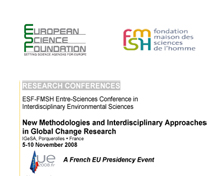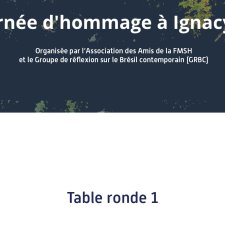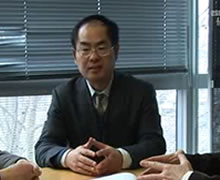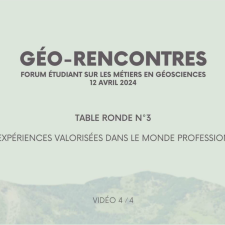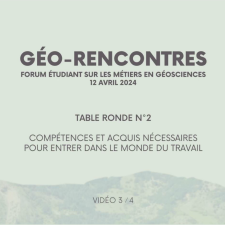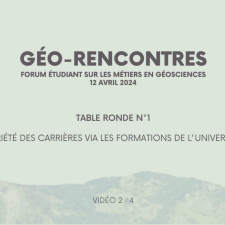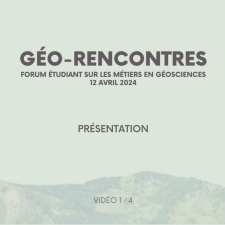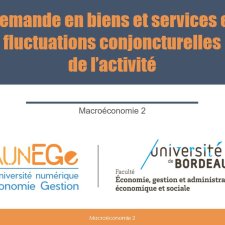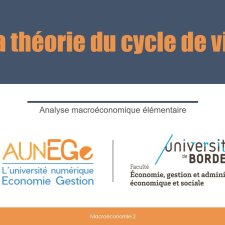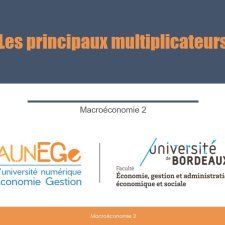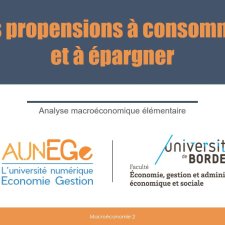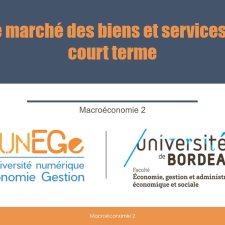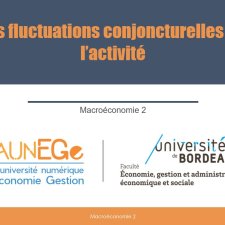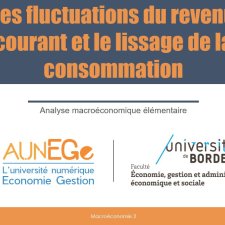Notice
Debate
- document 1 document 2 document 3
- niveau 1 niveau 2 niveau 3
Descriptif
The European Science Foundation (ESF) and the French Foundation of the Maison des Sciences de l’Homme (FMSH) (within the Entre-Sciences programme) have agreed to jointly develop a new conference series in environmental sciences; an effort to actively foster exchanges between scientists working in the humanities and social sciences and their colleagues in the life and natural sciences.
This interdisciplinary conference present the new advances in the modelling of the Global Change that combines Geosciences and Economics, with a perspective view from history - given the novelty of their interrelations – and from political science – given the impact of the model outputs in the public sphere. The conference gather together speakers and attendees from Europe, United States and Asia.
The conference focuses on new advances in the construction of models of the global change, in Earth sciences and in Economics. Given the issues at stake with Global Warning in terms of impacts and risks, these multidisciplinary approaches are necessarily placed in a public policy perspective, a case apparently unique in the history of science. Chaired by Joël Guiot, climatologist at the European Centre for the Research and Teaching of the Geosciences of the Environment (CEREGE, Aix-en-Provence) and Sylvie Thoron, economist at the Aix-Marseille Research Group in Quantitative Economy (GREQAM, Marseille), the conference aims at generating intense discussions between scientists coming from various disciplinary horizons, by emphasizing the need for integrative approaches when thinking of our future in terms of sustainable development.
>> More information on the web site site web Entre-Sciences Programme.
Intervention / Responsable scientifique
Dans la même collection
-
Long Term Climate Variability: from Past to Future and from Data to Models
GuiotJoëlData show that climate has always changed in the past, sometimes with a larger amplitude than what we experimented for two decades. But the main signatures of the anthopogenic forcing are the speed of
-
Detection and Attribution of Climate Change to Different Causes
PlantonSergeAccording to the last IPCC report, the most part of the observed increase in globally averaged temperatures since the mid-20th century is very likely due to the observed increase in anthropogenic
-
Setting Cumulative Emissions Targets to Reduce the Risk of "Dangerous" Climate Change
ZickfeldKirstenThe ultimate objective of climate change mitigation is to reduce the amount of anthropogenic greenhouse gas (GHG) emissions in order to achieve “stabilization of greenhouse gas concentrations in the
-
Debate
CiaisPhilippeSeguinBernardChauvinDominiqueThe European Science Foundation (ESF) and the French Foundation of the Maison des Sciences de l’Homme (FMSH) (within the Entre-Sciences programme) have agreed to jointly develop a new conference
-
The Intergovernmental Panel on Climate Change and the Challenges of Climate policy, Equity and Ethi…
SomervilleRichardThe 2007 Intergovernmental Panel on Climate Change (IPCC) report provides clear guidance for the greenhouse gas emissions reductions needed to limit global warming to specific targets such as 2 °C
-
Climatic Hazard Mitigation Through Risk and Resilience Committees in Nepal
Raj AryalKomalNepal lies in an ecologically fragile and seismic region with a history of devastating Glacier Lake Outburst Flood (GLOF), landslides and earthquakes. Increases in temperature could increase the
-
Debate
BergerA.GuiotJoëlMannMichael E.DanisPierre-AlainAmatoVincenzoThe European Science Foundation (ESF) and the French Foundation of the Maison des Sciences de l’Homme (FMSH) (within the Entre-Sciences programme) have agreed to jointly develop a new conference
-
The State of UK Climate Modelling
FisherJoshuaThe UK recently invested £23 million (~US$40 million) in a program in Quantifying and Understanding the Earth SysTem (QUEST). The final product of this investment is the state-of-the-art QUEST Earth
-
Climate, Geography and Macroeconomics: Revised Data, Refined Analysis and New Findings
FüsselHans-MartinAssessments of social and economic impacts of climate change are primarily based on the results of biophysical climate impact models, which are aggregated, extrapolated and/or valued in monetary terms
-
The Effect of Thermal Pollution on Benthic Foraminiferal Assemblages, in the Mediterranean Shore Fa…
ArieliRuthieOver the past several decades public and scientific awareness to global warming has increased significantly. As a result, many studies have examined the affects of global warming. However, the
-
The Sustainability of Kyoto's Architecture: Where Did the Victims of Climate Change Go?
DupuisJohanncept of “expropriation” in the case of territories exposed to a rise in sea levels. The premise of my project is that although future generations in all countries will be affected by climate change,
-
IPCC Working Group II
ChanzyAndréThe European Science Foundation (ESF) and the French Foundation of the Maison des Sciences de l’Homme (FMSH) (within the Entre-Sciences programme) have agreed to jointly develop a new conference
Avec les mêmes intervenants et intervenantes
-
Accueil et table ronde 1 | Croissance et régulation économique et sociale, écodéveloppement
RacineJean-LucCohenAntoninAymardMauricePottierAntoninBoyerRobertHourcadeJean-CharlesLa RovereEmilio LèbreGarciaAfrânioRivronVassiliRendre hommage à Ignacy Sachs (1927-2023), c’est saluer le parcours visionnaire du théoricien de l’écodéveloppement qui, dès les années 1970, pose les bases d’un équilibre à atteindre entre croissance
-
The Intergovernmental Panel on Climate Change and the Challenges of Climate policy, Equity and Ethi…
SomervilleRichardThe 2007 Intergovernmental Panel on Climate Change (IPCC) report provides clear guidance for the greenhouse gas emissions reductions needed to limit global warming to specific targets such as 2 °C
-
Interlocking Natural and Social Systems - Resilience, Governance and Research Policy Considerations
SvedinUnoIn this presentation the start is made from the 2007 IPCC statement that it now seems consolidated that there is a clear sign of the importance of the anthropogenic factors in the climate change
-
The Economics of the Climate/Development of the Gordian Knot; Beyond a Sound Pessimism
HourcadeJean-CharlesWe will first suggest that costs of meeting ambitious climate targets capable to stabilize global warming below 2°C or 3°C temperature increase have been underestimated so far. The first reason is the
-
IPCC Working Group I
SomervilleRichardThe European Science Foundation (ESF) and the French Foundation of the Maison des Sciences de l’Homme (FMSH) (within the Entre-Sciences programme) have agreed to jointly develop a new conference
-
Post-2012 options to Reduce Greenhouse Gas Emissions
DuvalRomainThe presentation will focus on post-2012 options to reduce greenhouse gas (GHG) emissions, putting special emphasis on the need to abate world emissions. The presentation will focus on post-2012
-
Round Table
JoussaumeSylvieChanzyAndréSomervilleRichardDuvalRomainThe European Science Foundation (ESF) and the French Foundation of the Maison des Sciences de l’Homme (FMSH) (within the Entre-Sciences programme) have agreed to jointly develop a new conference
-
The Post-Kyoto
DuvalRomainThe European Science Foundation (ESF) and the French Foundation of the Maison des Sciences de l’Homme (FMSH) (within the Entre-Sciences programme) have agreed to jointly develop a new conference
-
Risques, expertise et politiques
ArmatteMichelDahanAmyCouvetDenisHourcadeJean-CharlesRotaruMonicaEn réunissant des scientifiques, des experts du Groupe intergouvernemental d'étude du climat (GIEC), des représentants d'administrations et d'institutions de diffusion de (information scientifique, le
Sur le même thème
-
Géo-Rencontres 2024 / Les expériences valorisées dans le monde professionnel
LilloEmmaAraujoJulieHuartFlorianDubreuRomainBuquetDamienChazalLauraBorieMarianeForum sur les métiers en géosciences organisé par les étudiants du CMI Ingénierie Géologique et Civile, Université de Bordeaux, 12 avril 2024
-
Géo-Rencontres 2024 / Compétences et acquis nécessaires pour entrer dans le monde du travail
BrinonJulietteAmoleFili-FenuaPretouFrédéricCampetHugoLiébauxAlbinDe AlemeidaMarie-LouPoirierAymericDufrenoyAudreyForum sur les métiers en géosciences organisé par les étudiants du CMI Ingénierie Géologique et Civile, Université de Bordeaux, 12 avril 2024
-
Géo-Rencontres 2024 / Variété des carrières via les formations de l'université
InguimbertDianeLacazeRomaneLemaitreLaurieChazalLauraMontjeanPascalPoudevigneJacquesPortefaixFrédéricForum sur les métiers en géosciences organisé par les étudiants du CMI Ingénierie Géologique et Civile, Université de Bordeaux, 12 avril 2024
-
Géo-Rencontres 2024 / Présentation
LatasteJean-FrançoisLavieThéoForum sur les métiers en géosciences organisé par les étudiants du CMI Ingénierie Géologique et Civile, Université de Bordeaux, 12 avril 2024
-
Tokyo, plus grande « ville » au monde : aménager et gouverner la démesure
Languillon-AusselRaphaëlAvec ses quelques trente-cinq millions d’habitants, Tokyo est la « ville » la plus peuplée au monde, et l’une des métropoles les plus riches. Cette présentation vise à décrire, analyser et expliquer,
-
Demande en biens et services et fluctuations conjoncturelles
Maveyraud-TricoireSamuelDemande en biens et services et fluctuations conjoncturelles
-
-
-
Les propensions à consommer et à épargner
Maveyraud-TricoireSamuelLes propensions à consommer et à épargner
-
Le marché des biens et services à court terme
Maveyraud-TricoireSamuelLe marché des biens et services à court terme
-
Les fluctuations conjoncturelles de l’activité
Maveyraud-TricoireSamuelLes fluctuations conjoncturelles de l’activité
-
Les fluctuations du revenu courant et le lissage de la consommation
Maveyraud-TricoireSamuelLes fluctuations du revenu courant et le lissage de la consommation


